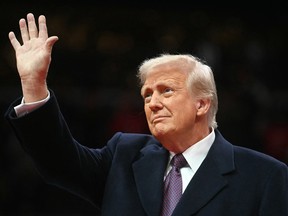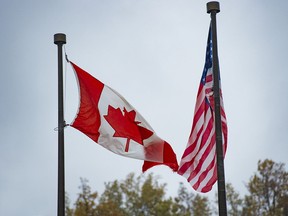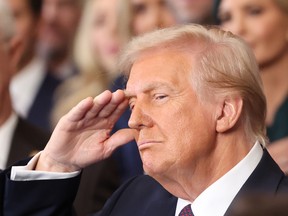Business groups view decision as a temporary reprieve and vow not to be complacent
Article content
United States President Donald Trump promised an “America First” agenda and trade protectionism on his first day in office, but was not expected to immediately impose tariffs on Canada.
Article content
Article content
Instead, Trump was reportedly planning to issue a memo to direct federal agencies to study “unfair trade practices” committed by Canada, Mexico and China, according to U.S. media.
Advertisement 2
Article content
The decision marks a departure from Trump’s November pledge to impose 25-per-cent across-the-board tariffs on all Canadian and Mexican goods on inauguration day.
Trump initially tied the tariffs to concerns over the U.S.-Canada border, but later blamed imbalances in the U.S.-Canada trade relationship. Canada has promised a suite of countermeasures if Trump follows through on his threat.
The memorandum, among the numerous executive orders Trump plans to sign, reportedly directs federal agencies to review whether Canada and Mexico are in compliance with Canada-U.S.-Mexico Agreement.
Trump separately has promised to establish an “External Revenue Service” to collect revenue from tariffs.
Despite the apparent pause on tariffs, Trump used his inaugural address to declare his protectionist intentions.
“I will immediately begin the overhaul of our trade system to protect American workers and families,” Trump said. “Instead of taxing our citizens to enrich other countries, we will tariff and tax foreign countries to enrich our citizens.”
Canadian business leaders were hesitant to declare victory, as the tariff threat remained on the table.
Article content
Advertisement 3
Article content
“Let’s call it what it is, which is a time out,” said Business Council of Canada chief executive Goldy Hyder. “It is not the end of the game and we’re going to be going back to this in a matter of probably six to eight weeks or so, we don’t know the exact timeline.”
Hyder said the decision to not impose tariffs on Monday came down to the weekend, with policymakers around Trump divided on the timing, with a contingent that wanted to see trade action delayed winning out.
“So we’re lucky that that side won out today,” said Hyder. “We’ve got a bit of a reprieve.”
Conference Board of Canada chief economist Pedro Antunes believes the 25-per-cent tariff threat from the Trump administration remains a negotiation tactic, but still believes the possible threat of tariffs will feed uncertainty.
“Markets don’t really believe these threats, they see it as a bargaining chip and bargaining strategy,” said Antunes. “I do think that if we do see tariffs pop up in the future, it will still be very uncertain because we don’t know how long they will last.”
The Canada-U.S. trade relationship amounted to over $1 trillion in two-way trade in 2023, with over 2.3 million Canadian jobs dependent on Canada’ exports to the U.S. Early estimates by the Canadian Chamber of Commerce show tariffs of that magnitude and the resulting trade war, could lead to -2.6 per cent hit to Canada’s GDP and a -1.6 per cent hit to U.S. GDP.
Advertisement 4
Article content
Catherine Fortin-LeFaivre, vice-president of strategic policy and global partnerships at the chamber, says her organization will continue its work and will be keeping a close eye on the unveiling of an “America First” trade policy that Trump has made a priority during his administration.
“The day is not done yet and there is always tomorrow,” said Fortin-LeFaivre. “We’re taking it day by day, we’re not going to be complacent, we’re going to continue the work we’ve been doing with our Canadian chamber team and all our on-the-ground partners.”
Randall Bartlett, deputy chief economist at Desjardins Group, said just the threat of tariffs is enough to de-incentivize businesses from investing in Canada.
“You have an uncertain trade regime, and Canada is very exposed to trade, particularly with the U.S., it creates a disincentive for business investment when we don’t know what the trade regime is going to look like from week to week,” he said.
Bartlett added that the proposed study of Canada’s trade practices will serve only to “prosecute Canada” with regards to its trade position.
Advertisement 5
Article content
Hyder said he is already seeing capital re-allocation from Canada to the U.S., which is Trump’s intention.
“So we must respond in kind when it comes the overall competitiveness of Canada, which includes on tax policy, on regulations, which is, frankly, the biggest issue I hear from my members, is we’re over-regulated,” he said.
Recommended from Editorial
-

Loonie gets temporary reprieve as Trump holds off on tariffs
-

How Trump’s tariff war could hit Canadians’ wallets
Hyder added the need to scrap the proposed cap on emissions by the federal government and getting permitting reform to expand major infrastructure projects like ports, railway tracks and pipelines.
“All of these things are critically important if we’re going to compete with the United States and as I said, I think we owe the president a thank you, he’s woken us up,” he said.
• Email: jgowling@postmedia.com
Bookmark our website and support our journalism: Don’t miss the business news you need to know — add financialpost.com to your bookmarks and sign up for our newsletters here.
Article content
Trump tariff ‘time out’ gives businesses breathing room
2025-01-20 23:08:38







